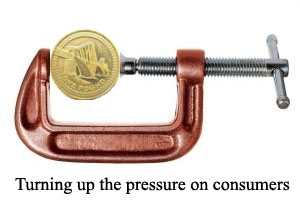Green taxes are coming!
 UK green taxes could be supplemented by lower income tax
UK green taxes could be supplemented by lower income taxGreen taxes have been on the political radar for a while but no one party seems to have cracked them yet. While all the major UK parties share the sentiment that carbon-emitters must pay and green behaviour should be rewarded, practical reforms to the tax system to reflect these priorities are yet to be worked out.
Cue the recent parliamentary launch of the Green Fiscal Commission, an independently funded think tank dedicated to demystifying green taxes. The commission will research ways to create a ‘revenue neutral’ green tax shift in the UK of up to 20 per cent to bolster carbon-cutting policies.
At the launch Lord Adair Turner, former director general of the Confederation of British Industry, the UK’s business lobby group, and a member of the commission, criticised the lack of consensus forming in British politics. “You can bet that although all political parties realise that there needs to be a shift in the tax system to reward greener behaviour… as soon as the bill comes up in parliament, the opposition parties will fight against it.”
Lord Turner said a “big shift” in taxes was needed to affect consumer behaviour. Turner’s views have become influential following his latest appointment as the first chair of the new Committee on Climate Change, a new statutory advisory body to be set up under the UK climate change bill, which is expected to pass as law this summer.
Although independent from government, the commission contains members from across the political spectrum in order to stimulate cross-party agreement on green taxation. Its research is due for completion in March 2009.
A green tax structure has long been considered by business as the way forward to stimulate a low-carbon economy, and was further recommended in the November 2007 CBI climate change report.
Double dividend
Rather than raising extra revenue, the commission says, it will look into gradually decreasing work taxes whilst raising pollution taxes incrementally.
The double pay-off here, says John Manning, head of environmental tax and regulation at accountants PricewaterhouseCoopers, is that whilst lessening the damage to the environment you encourage more people into work, which boosts the economy.
This is not about finding new ways to generate revenue for the government, says Paul Ekins, professor of energy and environment policy at King’s College London and director of the green fiscal commission. “Rather, it is a way to change behaviour.”
Under the new UK tax regime, Ekins says, we can expect energy to become more expensive.
No subsidy
He dismisses the idea that businesses should be given tax incentives to lower their carbon emissions. “This would amount to a subsidy,” he says. The purpose of the new tax system would be to extend the reach of the carbon markets.
“We don’t want people to be taxed doubly for their energy, for example, energy companies that already pay for their carbon under the EU emissions trading scheme,” says Ekins. “Similarly, people should be able to see the direct link between carbon emissions and tax.”
Speeches at the parliamentary launch of the commission revealed that cars were key to the tax debate, and that road pricing was still on the cards. One MP even mentioned personal carbon trading, although the scheme remained “a long way away”.
According to Ekins, industry included in the EU emissions trading scheme would be best taxed via the auctioning of carbon permits (the European Union aims for 60 per cent auctioning from 2013), whilst receiving some compensation in the form of income tax relief. In order to maintain UK competitiveness, border tax adjustments are also being discussed. Ekins admits that WTO rules on import taxes may restrict major alterations, however.
More revenue, less carbon
“Making lower carbon activities a more economic choice” is the green fiscal commission’s aim. The tax shift could go in very different directions, however. Whilst Prime Minister Gordon Brown suggested to the EU last year that lowering VAT for greener products would be desirable, this has sent alarm bells ringing in Europe. Experts like Ekins suggest that a green tax structure should “raise more revenue than it cuts carbon” to ensure a stable government income.
The question remains whether a balance can be struck between green taxes and incentives. PwC’s Manning is optimistic, pointing out that the shift to unleaded petrol was made relatively painless by raising taxes on leaded petrol.
However, when no fuel alternative currently exists, such as in aviation, an emissions tax could prove more painful.
Ekins admits that whilst more money may be needed to fund the alternatives, such as R&D into low-carbon technology, housing insulation and public transport, these extra costs will not be factored into the green fiscal commission’s work.
Slowly does it
According to Ekins, the fiscal commission will be modelling ways to gradually increase green taxes in order to reach the 60 per cent emissions reduction target by 2050. “We could start with a 10 per cent tax shift which could go up to a 20 per cent shift by 2020,” he says.
Persuading UK consumers that a green tax shift does not mean an overall increase in tax will be a major challenge. However, the real challenge may lie in offering low- carbon alternatives in the face of a rising tax on carbon.
Write to Zara Maung, editor at zara.maung@ethicalcorp.com,
or write to the Editor at zara.maung@ethicalcorp.com.
You can return to the main Market News page, or press the Back button on your browser.

